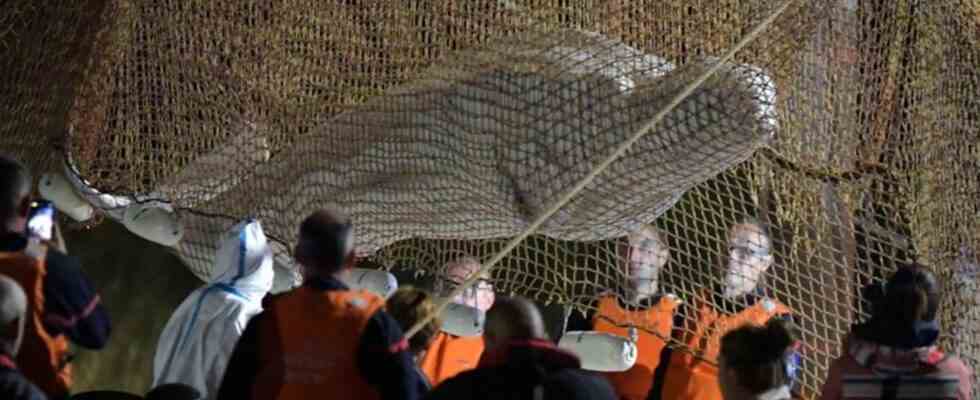France
Beluga whale dies in Seine despite rescue effort
Unfortunately in vain: rescuers pull a net to save the beluga whale at Notre Dame de la-Garenne. photo
© Jean-Francois Monier/AFP/dpa
The fate of a white whale in the Seine has kept France in suspense for days. With a spectacular action, the beluga is heaved out of a lock. But then there is sad news.
Although the beluga whale that went astray in the Seine in France was emaciated and weak, animal rights activists hoped for a rescue, in the end in vain.
The white whale, which was stuck in a lock for days, died on Wednesday during a relief operation. “Despite an unprecedented rescue operation of the beluga, we regret to inform you that the whale has died,” said the prefecture in Caen. After being rescued at night, the animal’s breathing deteriorated noticeably during transport to a seawater tank in Normandy, which is why the whale was euthanized, said official veterinarian Ollivet Courtois.
80 experts were involved in the campaign
The white whale, located in the Seine more than a week ago, was to be taken to Ouistreham for treatment in a refrigerated truck. After a rescue operation lasting several hours, in which more than 80 experts were involved, the beluga whale was lifted out of the lock around four o’clock on Wednesday morning, as the prefecture in Évreux announced. A first on-site examination confirmed the poor condition of the whale, which had lost 800 kilos. Veterinarians therefore considered his chances of survival to be low. Nevertheless, the transport of the whale, which was kept moist with towels, started around 06.30 a.m. with the aim of taking it to the sea after three days of treatment in Normandy.
“We are devastated by this tragic outcome, which we knew was very likely, but we thank everyone who has been involved in this unprecedented mobilization,” said Sea Shepherd France, a charity that helped rescue the whale. The male animal did not suffer from an infection, but his digestion no longer worked, which is why he did not eat anymore. However, his true condition is unknown. It is not known why the white whale, which is actually native to arctic and subarctic waters, strayed into the Seine. Now an autopsy of his cadaver is planned.
Back then, Moby-Dick made it back to the sea
More than 50 years ago, a white whale also caused a stir in Germany. The animal, first sighted on May 18, 1966 in the Rhine near Duisburg, promptly named Moby-Dick after the novel of the same name, kept people on the Rhine up to Bonn as well as captains and passengers on the river in suspense for weeks. Self-proclaimed whale hunters tried to catch the white colossus with nets, poles and tranquilizer darts. But he escaped again and again. During the roughly four weeks in the river, Moby-Dick lost his brilliant white and became increasingly mottled and gray in appearance. On June 16, however, he finally reached the North Sea again.
Simply hoping that the beluga whale in the Seine would find its way to the sea on its own, like Moby-Dick did back then, was not an option, explained Sea Shepherd France. The white whale tended to move in the wrong direction towards Paris. There he would have become a tourist attraction in the holiday month of August, but with little chance of survival.
Most recently, in 2018, a beluga whale strayed into the Thames Estuary east of London, possibly because it was following a school of fish there. In 2006, one of the white whales even swam through the Thames in the middle of the British capital, past sights such as Big Ben and the Westminster Parliament.
And it is not the first time in France that a large whale has strayed into the Seine: in May an orca starved to death after weeks of odyssey in the river, in July a fin whale was presumably sighted in the river estuary near Le Havre.

